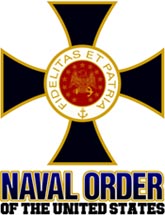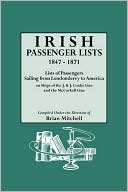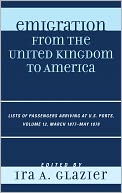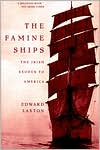Ireland
° Ireland:
° Belfast
° Giant's Causeway
° Bristol
° Cork
° Dublin ° Fallmore and Blacksod ° Galway
° Limerick
° Londonderry
° Queenstown
° Rosslare
° Waterford
° Home Rule in Ireland
° Irish in America
Galway (Gaillimh), Connacht (West Ireland)
March 1, 1851, Atlas, London, Middlesex
AN IRISH CARGO
East and west there flows a deep and seemingly unassuageable flood of Irish emigration. No condition of things at home appears to have much effect upon it. After a period of famine and convulsion, indeed, the stream runs more turbid and hurriedly; but neither plentiful harvests, political calm, nor commercial activity can ever cause the channel to become dry.
In the latter direction the normal current that sets in towards the American shores has averaged 250,000 persons for some years past, with an occasional "freshet" after scarcity or rebellion. Towards England the emigration assumes a more intermitting form. The tide may even recede at intervals. But in the long-run there is no doubt that vast masses are impelled hither with never find their way back. Mr. Cobden almost ventures to calculate the period when Lancashire will become a colony of Ireland. And that manufacturing county affords an asylum to but a tithe of the refugees who either settle in the island, or make it an outlet to other scenes of enterprise.
But although the absorbing powers of England and America may, on the whole, be pretty equal, the hopes and the fate of the exiles from Irish homes to depart in one direction or another are strikingly different. Let us look back at the pregnant instances which occurred only within the past week, and were published in the daily papers within a few hours of each other. It is a picture that might well cover an Englishman with sorrow and shame, if it did not prompt him to an endeavour to remove the sources of so mortifying a parallel.
 |
Eviction Duty in Ireland: Galway with Military and Police Forces The Illustrated London News, 1886 |
On Tuesday last an inquest was held on the body of an infant, aged four weeks, which had died on board the Pelican steamer, while on the passage from Ireland to London. The evidence brought forward left with the jury no doubt that the wretched babe had perished from cold and exposure. Its mother, a woman named Ann Connell, had paid 2s., raised by pawning her clothes, for a deck passage to London; and on the deck she and her child remained for three days and nights without any covering but the air, exposed to the tender mercies of a February sky. It speaks well to the mother's tenderness that her child lived until the steamer had nearly arrived in port. On arriving in London, however, it was taken to an infirmary, where the nurse, who was examined upon the inquest, declared that she received it a corpse, though in "plump condition," and evidently having been a healthy, well-cared-for infant. The scene on board the steamer, of which the evidence adduced upon the inquiry over Ann Connell's babe gives us an accidental glimpse, is lamentable enough. "Seven hundred and fifty men, women, and children," we are told, were passengers upon the deck of the Pelican on that single voyage. They were all "huddled together."
"We were so closely packed," pursues the witness, "that we could scarcely move. The rain came down several times, and the passengers were unable to get under any covering." The deck was wet and dirty, and was washed on Saturday while the crowd remained packed together. On the same deck were a number of cattle, who appear to have been much better off than the human passengers, many of whom throughout the three days and nights of the voyage had "scarcely any food."
This, be it observed, is recorded as no extraordinary incident, commanding notoriety through its intrinsic interest. It is the common "log-book" of a passage performed weekly and daily, to which we obtain access in a perfectly incidental and circuitous manner. If Ann Connell's infant had endured the cold and exposure but a few hours longer, and died in the infirmary instead of on the deck of the Pelican, not a word would have been said of the horrible three days and nights that witnessed the transit of the population of two Irish villages from Cork harbour to the Thames.
Nor is it of those horrors that we wish to speak. Three days and nights, though their lingering hours pass amid cold, and wet, and hunger, nevertheless do pass. But what of the arrival?
Seven hundred and fifty persons land out of one vessel on the Rotherhithe Wharf; -- what is their welcome and destination? It is not too much to predict that out of the whole number nine in every ten came over with no other purpose or profession than beggary. And these are but detachments of the great army. Every week sees the arrival of two or more steamers, as crowded as the Pelican, though we hope after a more prosperous passage, and crowded with the same class of emigrants. The authorities in Ireland, whom the law calls "guardians" of the poor, help forward the melancholy process. Mr. John Gardener, the summoning officer to the jury at the inquest, declared that he had known as many as 1,000 brought over at one time, at the rate of 1s 6d. or 2s. a-head, for the greater part of whom the parochial authorities had found the passage money. Well might the witness wonder what Government long ago had not found means to "put a stop to it." Turn we to the American side of the picture. In a letter from the Rev. Sidney Godolphin Osborne, published with the last few days, we are told:
Within these few weeks between 100 and 200 of the peasantry have left one neighborhood, in the county of Galway, as emigrants. It will be, I think, some matter of surprise to most of us to learn how quickly the being who at home has the character not merely of being most miserable, but most helpless, abroad becomes comparatively a man of wealth; the late starving dependent upon the law's extorted charity is transferred into a liberal agent of good to those who are yet in that condition. A young man who only left the employ of a friend of my own, a most benevolent English settler in Connemara, last spring, has already sent through the said employer's hands 16l. for his aged parents. Several who left in the summer have send 4l. or 5l. each. Two young men, who left Ireland last September, and sailed to New Orleans, and thence 500 miles up the Mississippi, have each already sent 4l. for their relations at home. The instances I have quoted might be multiplied to an extent I could hardly expect your readers to believe. There surely is good stuff in the character of these people if it was turned by judgment to a good purpose.
In England the Irish emigrant casts himself adrift upon the stray charity of London streets, or the country highways -- thinking himself lucky if he can keep beyond range of the policemen and the parish officers. In America he becomes industrious and independent. Travelling eastward, he takes to begging -- travelling westward, to work. Can there be any doubt of the point of the compass to which policy would direct him? Napoleon wrote "To England" on every sign-post in the north road of France. In the famishing districts of Ireland we would write in the boldest of characters, "To Canada."
September 27, 1858, Daily Alta California, San Francisco, California, U.S.A. .
The New York and Galway Line of Steamships.
The "Green Isle" has not alone been recently wedded to the Western Hemisphere by the telegraphic cable, but simultaneously therewith hts gone into operation a line of steamers, plying between Galway, on the western coast of Ireland, and New York. The success which has in the opening crowned this new and magnificent enterprise, is remarkable in the extreme. At present but two steamers have been placed in the line, one of which, the Prince Albert, it is said, has no superior in point of speed, to any sea-going steamer afloat. On her last trip from Galway to New York, she made the distance from the former place to Cape Race, Newfoundland, in the incredibly short space of six days, and a little over eleven hours. From this point it is stated that " she would have arrived at Halifax in thirty-six hours, had she not been obliged to lie to for twenty-four hours in a dense fog." Again " her passage from Halifax to New York was the fastest on record, being accomplished in about fifty-two hours."

The advantage of Galway as a point for steam vessels plying between America and Great Britain, to arrive at and depart from, have not until the inauguration of the new line of steamers been fully demonstrated, although warmly advocated prior to the opening of the line. The city is one of the most ancient towns in Ireland, and its broad and beautiful harbor has given it a name and fame from time immemorial, although its prosperty has been slow and snail-like, until it was brought into close connection with the great commercial marts through the aid of steam. It has been brought within three hours of Dublin, eight or ten hours of Holyhead, and ten to thirteen hours of Liverpool. "With proper steam vessels, the passage from Galway to Halifax may be made in six days, and from thence to Boston, Massachusetts, by railroad in twenty-four hours," thus making an actual shortening of the route, over that of the Cunard line, of from three to four days. A very important consideration in these fast times.
The putting on of this new line of steamers, owes its origin mainly to the efforts and capital of Mr. Lever, a rich and influential English gentleman. At a banquet given to the Lord Lieutenant of Ireland, on the 22d of July at Galway, Mr. Lever was present, and in response to the drinking of his health, he "gave details of his exertions to procure a first class steamer to sail from Galway. He offered to buy the Arabia. The Albert, which was coming to Galway, was the fastest steamer in the world. He hoped the people of Ireland would speak well of and encourage the project, and he was certain of its success from its many advantages. When they proved the route was the quickest, they would demand the English and American mails.
"The Marquis of Clanricarde in returning thanks, advocated the project, and said it was the duty of all Ireland to assist in making it successful.
"From the brilliant results so far, there is a strong probability that Mr. Lever's statement that "when they proved the route was the quickest, they would demand the English and American mails," will be carried out fully, and the Cunard line, that has so long enjoyed this great monopoly, will be forced to yield to its rival.
The Lord Lieutenant at the banquet before referred to, in a brilliant speech delivered upon the occasion, after alluding to the warm reception that had been given him, spoke as follows:
"The city, with its ancient traditions your wide and noble bay, with the waves of the Atlantic flowing in on either side of the wild Islands of Arran the distant mountains of Connemara Lough Corrib, whose surface I first disturbed with steam (cheers). I mean the canal into Lough Corrih the representatives of the ancient tribes and the lovely daughters of the west are again all before me, not only a dream but a bright reality (great cheering). But, gentlemen, there is a change. When I was here before I was shown your bay I was told what a magnificent harbor it would make; I was shown that there was nothing between it and the great Continent of America; I was perfectly aware of its advantages (cheers) but there was no Lever (loud cheering); there was, I say, no Lever on which to found the structure (cheers). My friend Father Daly (repeated cheering) discoursed to me, as he always doe*, most energetically and most eloquently, on the advantages of Gal way, and pointed out that it was the true highway to America (cheers). If eloquent words and good will could have effected that object between us, a Leviathan, at least, would have sprung up to plough the waters between Ireland and the New World (loud applause). Consistency and determination have at length prevailed, and I do rejoice to say that not only have you one steamer, but I trust another and another shall succeed ; not only have you sent one pioneer to take possession of that highroad, but I truit another ship will soon be on its way in her wake (applause). Ido take l will not say credit but I rejoice to say that I, perhaps, have been a litttle instrumental in obtaining the assistance of the Post Office in this undertaking; and I can assure you that I did not allow one day to pass after the subject wts brought before me until I recommended that assistance to be given to my noble friend the Postmaster-General (hear, hear). My noble friend on my left. Lord Clanricarde, that already occupied that post (loud cheers), and I rather think he will allow that these sort of changes ne not easily made that changes in the Post Office do not emanate from it quite to quickly as the letters themselves (cheers). However, my noble friend, the Postmaster General, as I have no doubt my noble friend on my left would have equally done, at once acquiesced in my views (hear, hear). There is a change also, as your chairman has told you, in the prospects of the country. lam happy to say that I can assure you that I did not conceive it possible when I came to Ireland, that I could have found that such extraordinary improvement could have taken place generally over the face of the country as I have found since my arrival (hear, hear). Agriculture has flourished crime has decreased in the most wonderful manner (hear, hear), and I do hope and trust that differences have diminished (loud cheers).
We have here not only a foreshadowing of the favor with which the new project is likely to be received by British statesmen, but also a declaration that speaks in strong and pleasing emphasis of the days of prosperity that are dawning upon Ireland, after her long night of oppression. Within the past few years, agriculture has indeed flourished and crime decreased. America haa opened her fertile plains to the thousands of the poor working classes who had all their days groped through poverty and despair in the mother country, and thus relieved of a portion of her surplus population, and with more liberal laws than those under which- she formerly struggled, Ireland is rising to her proper rank in the scale of nations, and open-handed prosperity will soon shower its blessings upon her people.
Irish Orientalism: A Literary and Intellectual History (Irish Studies)
Joseph Lennon

1899. World's Fleet. Boston Daily Globe
Lloyds Register of Shipping gives the entire fleet of the world as 28,180 steamers and sailing vessels, with a total tonnage of 27,673,628, of which 39 perent are British.
| Great Britain | 10,990 vessels, total tonnage of 10,792,714 |
| United States | 3,010 vessels, total tonnage of 2,405,887 |
| Norway | 2,528 vessels, tonnage of 1,604,230 |
| Germany | 1,676 vessels, with a tonnage of 2,453,334, in which are included her particularly large ships. |
| Sweden | 1,408 vessels with a tonnage of 643, 527 |
| Italy | 1,150 vessels |
| France | 1,182 vessels |
For Historical Comparison
Top 10 Maritime Nations Ranked by Value (2017)
| Country | # of Vessels | Gross Tonnage (m) |
Total Value (USDbn) |
|
|---|---|---|---|---|
| 1 | Greece | 4,453 | 206.47 | $88.0 |
| 2 | Japan | 4,317 | 150.26 | $79.8 |
| 3 | China | 4,938 | 159.71 | $71.7 |
| 4 | USA | 2,399 | 55.92 | $46.5 |
| 5 | Singapore | 2,662 | 64.03 | $41.7 |
| 6 | Norway | 1,668 | 39.68 | $41.1 |
| 7 | Germany | 2,923 | 81.17 | $30.3 |
| 8 | UK | 883 | 28.78 | $24.3 |
| 9 | Denmark | 1,040 | 36.17 | $23.4 |
| 10 | South Korea | 1,484 | 49.88 | $20.1 |
| Total | 26,767 | 87.21 | $466.9 | |








 Copyright ~ 1998-2018.
Copyright ~ 1998-2018. 